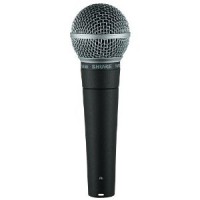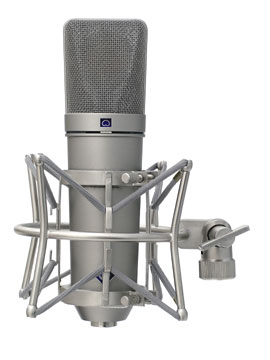VAM 014 | Interview with Jack Angel, Part 2
Welcome to episode 14 of the Voice Acting Mastery podcast with yours truly, Crispin Freeman!
As always, you can listen to the podcast using the player above, or download the mp3 using the link at the bottom of this blog post. The podcast is also available via the iTunes Store online. Just follow this link to view the podcast in iTunes:
http://www.voiceactingmastery.com/podcast
In this episode, I continue my very special interview with one of the great talents in the world of voice acting, Jack Angel.
As we heard in the last episode, Jack’s journey towards the world of voice over has been very unconventional! He started out wanting to be a cartoonist. When that didn’t pan out, he joined the army where he discovered his love of performing. After returning from the Korean war, he became a radio DJ.
In this episode, Jack shares with us how he made the transition from radio DJ to voice actor in cartoons. It was a sort of homecoming for him. He had always wanted to work on animation, but he thought his contribution would be as an illustrator. Little did he know that he would be giving voice to some of the best loved characters in cartoons!
Jack was actually fired from his job in radio, but that didn’t deter him! After being let go from the radio station, Jack redoubled his efforts and broke in to the world of voice acting for cartoons. What’s even more impressive is the mindset that he developed when facing the challenges that arise when pursuing a voice over career. The attitude he has towards voice acting is one of the most insightful and uplifting I’ve ever heard. I hope you enjoy it!
If you have any questions, please post your question as a comment to this blog post. Chances are, someone else has a similar question. By posting your question here on the blog, I get to communicate with all of you at once.
Thanks for listening!
Download Voice Acting Mastery Episode #14 Here (MP3)
VAM 013 | Interview with Jack Angel, Part 1
Welcome to episode 13 of the Voice Acting Mastery podcast with yours truly, Crispin Freeman!
As always, you can listen to the podcast using the player above, or download the mp3 using the link at the bottom of this blog post. The podcast is also available via the iTunes Store online. Just follow this link to view the podcast in iTunes:
http://www.voiceactingmastery.com/podcast
The holidays are approaching fast! As an end of the year treat, I thought I’d share with you a very special interview I did with one of the great talents in the world of voice acting, Jack Angel.
Jack started his voice acting career back in the 1970’s working on some of the most iconic animated shows of all time. Including
- Superfriends where he played Hawkman, Super Samurai and The Flash
- Voltron where he played the evil King Zarkon
- G.I. Joe where he voiced Wet Suit
- The Original Transformers where he played Ramjet, Astrotrain, Smokescreen and Omega Supreme.
While most voice actors developed their skills by going to acting school and working in the theater, Jack has an incredibly unique and unconventional path into the world of voice acting, from cartooning, to joining the army to becoming a DJ. I think you’ll find his journey incredibly inspiring and enlightening! I hope you enjoy it!
If you have any questions, please post your question as a comment to this blog post. Chances are, someone else has a similar question. By posting your question here on the blog, I get to communicate with all of you at once.
Thanks for listening!
Download Voice Acting Mastery Episode #13 Here (MP3)
VAM 012 | Microphone Basics, Part 2 – Pickup Patterns
Welcome to episode 12 of the Voice Acting Mastery podcast with yours truly, Crispin Freeman!
As always, you can listen to the podcast using the player above, or download the mp3 using the link at the bottom of this blog post. The podcast is also available via the iTunes Store online. Just follow this link to view the podcast in iTunes:
http://www.voiceactingmastery.com/podcast
In this episode, I continue my explanation of microphone basics. Specifically, I talk about the directionality or “pickup pattern” of a microphone.
As little as 5 or 10 years ago, no voice actor needed to understand any of the details of how or why a microphone worked. However, in order to be competitive in today’s market, every voice actor is expected to have their own home recording studio. That means that you need to be able to produce professional sounding tracks yourself. It’s vital, therefore, to understand some of the basic attributes of microphones and how they function so that you can sound as good as possible.
The directionality or pickup pattern of a microphone refers to how that mic treats sounds coming at it from different directions. Does the microphone capture all sounds equally from all directions, or does it prefer sound from one direction and reject sound from other directions? All microphones break down into two types:
- Omnidirectional Microphones
- Unidirectional Microphones
There are many different types of unidirectional mics, but the most common used in voice over uses a cardioid polar pattern. It’s named that because it favors sound from the front, but rejects sound from the rear. This creates a polar pattern graph that looks “pinched off”, almost like an upside-down heart. Another common pattern is the “shotgun” pattern that’s used for recording actors at a distance on TV and movie shoots.
Here are some pictures of the three polar patterns I mention in the podcast:
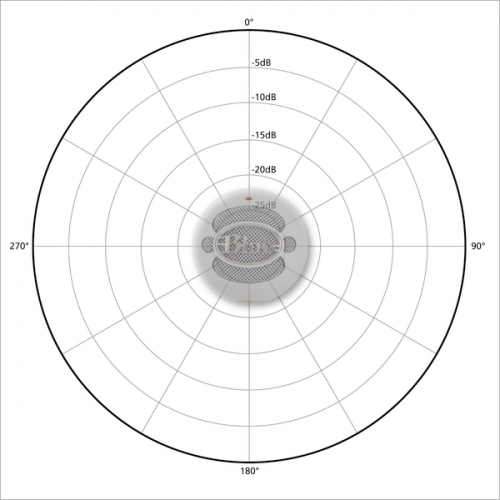
Omnidirectional Polar Pattern
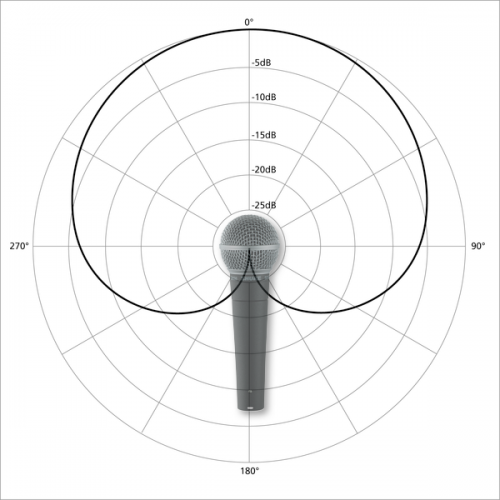
Cardioid Polar Pattern
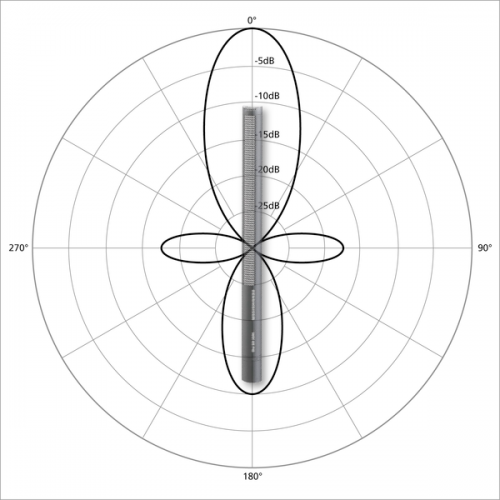
Shotgun Polar Pattern
All unidirectional mics, including the cardioid and shotgun patterns, also exhibit a behavior where the closer a vocalist gets to the microphone, the more bass or low frequency sound is recorded. This bass buildup is called Proximity Effect and can be used to create different effects when recording. I discuss all these topics at great length in the podcast. I hope you enjoy it!
If you have any questions, please post your question as a comment to this blog post. Chances are, someone else has a similar question. By posting your question here on the blog, I get to communicate with all of you at once.
Thanks for listening!
Download Voice Acting Mastery Episode #12 Here (MP3)
VAM 011 | Microphone Basics, Part 1 – Dynamic vs. Condenser
Welcome to episode 11 of the Voice Acting Mastery podcast with yours truly, Crispin Freeman!
As always, you can listen to the podcast using the player above, or download the mp3 using the link at the bottom of this blog post. The podcast is also available via the iTunes Store online. Just follow this link to view the podcast in iTunes:
http://www.voiceactingmastery.com/podcast
In this episode, I explain the basics of how a microphone works. I also outline the differences between the two dominant types of microphones in voice acting, dynamic and condenser microphones.
Historically, microphone technology was the responsibility of the recording engineer. It used to be that you could spend your entire voice acting career not knowing how a microphone worked as long as you knew which side of it to talk into. Those days are now gone. In the age of the internet, voice actors are expected to be able to make professional quality recordings from their home studios. A solid understanding of microphones and how they function is invaluable to understanding how to use the most important tool a voice actor has.
While there are many different types of microphone technology, there are two that have become dominant in the world of voice over:
- Dynamic Microphones
- Condenser Microphones
Here are some pictures of the two microphones I mention in the podcast, the Shure SM58 Dynamic microphone and the Neumann U87 Condenser microphone:
Shure SM58 – Dynamic
Neumann U87 – Condenser
If you have any questions, please post your question as a comment to this blog post. Chances are, someone else has a similar question. By posting your question here on the blog, I get to communicate with all of you at once.
Thanks for listening!
Download Voice Acting Mastery Episode #11 Here (MP3)
VAM 010 | How to Practice Voice Acting Anywhere
Welcome to episode 10 of the Voice Acting Mastery podcast with yours truly, Crispin Freeman!
As always, you can listen to the podcast using the player above, or download the mp3 using the link at the bottom of this blog post. The podcast is also available via the iTunes Store online. Just follow this link to view the podcast in iTunes:
http://www.voiceactingmastery.com/podcast
In this episode, I give practical advice on how to practice your voice acting skills no matter where you are.
So many of my listeners have told me how much they enjoy the podcast. Some listeners espouse a belief that because they’re not located in the right area that they are unable to improve their voice acting skills. I decided to dedicate this entire episode to giving you practical ideas about how to practice voice acting no matter where you’re located.
The truth of the matter is, if you really want to do something, nothing will stop you. This is true in all aspects of life. A burning desire to achieve a goal will inspire a resourcefulness in you that will surprise you.
One of the most important aspects is identifying yourself as a voice actor and then asking yourself a series of logical questions:
- I am a voice actor. What does a voice actor do?
- A voice actor acts. What is acting?
- Acting is playing pretend so believably that people will pay you to do it. How do you achieve that level of skill?
- By practicing. Where does one practice acting?
That is the question I spend most of the episode answering. There are all sorts of places you can practice your acting skills and I address many of them in this podcast including:
- Classes: High School, College and Community College
- Community Theater: Acting with a multi-generational troupe of performers is enlightening
- Online Voice Acting Communities: Websites where you can post your work and get feedback
- Individual Study: Mimicking other voice actors can help you expand your range
I’m sure many of you out there have even more ideas about how one can practice their voice acting no matter where you’re located. I look forward to your suggestions, advice and comments here on the blog!
If you have any questions, please post your question as a comment to this blog post. Chances are, someone else has a similar question. By posting your question here on the blog, I get to communicate with all of you at once.
Thanks for listening!
Download Voice Acting Mastery Episode #10 Here (MP3)
VAM 009 | Building Confidence
Welcome to the ninth episode of the Voice Acting Mastery podcast with yours truly, Crispin Freeman!
As always, you can listen to the podcast using the player above, or download the mp3 using the link at the bottom of this blog post. The podcast is also available via the iTunes Store online. Just follow this link to view the podcast in iTunes:
http://www.voiceactingmastery.com/podcast
In this episode, I address an issue that’s come up a lot here on the Voice Acting Mastery Blog. In fact, it’s one of the most common questions I get from aspiring voice actors:
What can I do to be more confident?
It’s an important topic and one that I felt deserved an in-depth answer. I do my best to outline the actions any person takes to try and bolster one’s confidence. However, I also reveal the important mental shift that must take place for any of those actions to have a truly lasting effect. I also tell the story of what I went through when I was trying to find my confidence as a young actor. I think you’ll find it enlightening.
If you have any questions, please post your question as a comment to this blog post. Chances are, someone else has a similar question. By posting your question here on the blog, I get to communicate with all of you at once.
Thanks for listening!
Download Voice Acting Mastery Episode #9 Here (MP3)

